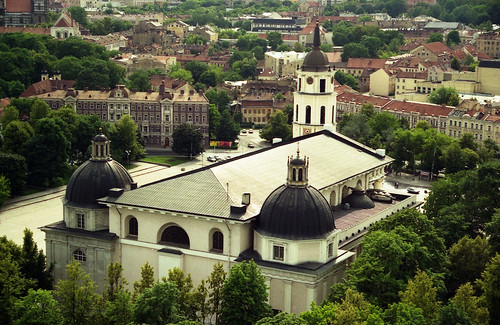Lithuania is one of the three Baltic states annexed by the Soviet Union after the second world war. Almost 50 years later, Lithuania became the first Soviet-occupied state to announce its independence (on 11 March 1990). In 2004, Lithuania joined NATO and the EU.

Anna M., Anna T., Phyllis, and Phil
Vilnius is the largest city and capitol of Lithuania. It has one of the largest and best preserved Old Towns. The Cathedral Basilica of St Stanislaus and St Ladislaus of Vilnius is the main Catholic cathedral in Lithuania. It is also when the oldest churches in Lithuania, mentioned for the first time in 1387. It has been rebuilt several times. Gediminas' Tower is the remaining part of the Upper Castle on top of the Gediminas Hill in Vilnius. Neris is the main river of Lithuania. Vilnius lies on its banks.
Old Town
Vilnius University is the first and largest university in Lithuania, as well as one of the oldest and most prominent higher education institutions in Central and Eastern Europe. The Gate of Dawn (c. 15 century) is a city gate in Vilnius and one of its most important religious, historical and cultural monuments. It is a major site of Catholic pilgrimage in Lithuania. I recall seeing very poor women lining the entrance. Reformatų Park was established in the Soviet era. It had lots of steps.
Vilnius University (c. 1570)
Today, Lithuania is a developed country with a high income and advanced economy. It was not when we visited in 1993. Vilnius still had a distinct Soviet feel to it. While the Lithuanian language had supplanted the Russian, the cinema was still Russian. The university still didn't have heat. Classes in the winter would have been brutal. The country was rebuilding after years of Soviet occupation. That's not something that can be overcome in a few years. In some countries, it takes generations.
Lithuania and the other Baltic countries remain on high alert, due to the latest invasion of the Ukraine by Russia.











No comments:
Post a Comment